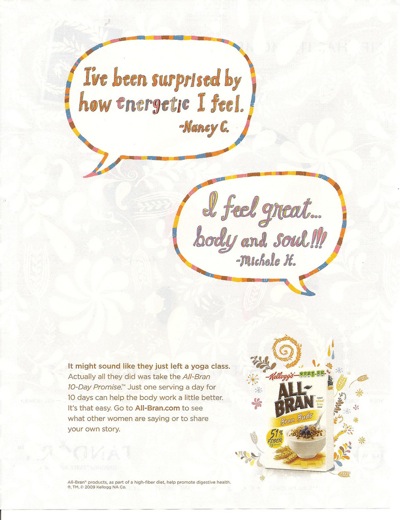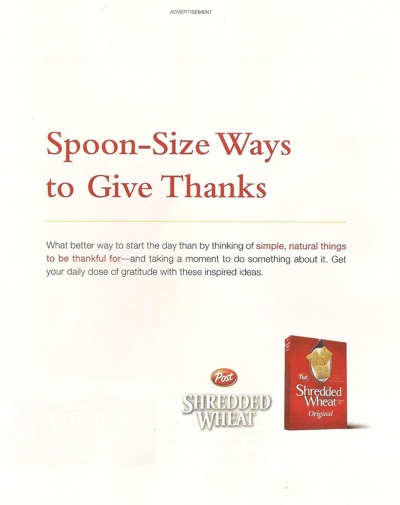Double Exposure (8): Soul Food
By:
October 29, 2009

A cherubic angel heralds the advent of Minute Maid Heart Wise orange juice, which miraculously — note how the bottle glows — resolves the tension between thesis (“It helps lower cholesterol”) and antithesis (“It tastes great”). What’s not to love about this synthesis? Middlebrows love them some dialectical synthesis. In their world, you can have your coffeecake and eat it, too. Skeptical highbrows and lowbrows will tell you that this is impossible. Neo-aristocratic anti-lowbrows and pseudo-populist anti-highbrows are idealists; they know what they know. But Middlebrows believe!

BELIEVE: in subtle and not-so-subtle ways, this is what Middlebrow is forever persuading us to do. High Middlebrow mediates between Highbrow and Anti-Lowbrow, while Low Middlebrow mediates between Lowbrow and Anti-Highbrow. So middlebrows are semi-skeptical, semi-idealistic. Which explains, for example, why Leo Strauss and his neocon students were forever insisting upon the importance of religion in a liberal capitalist society, though they themselves were irreligious. They weren’t hypocrites, that is; they were middlebrows. Neocons are utopians who don’t believe in progress; they’re millennialists convinced that we’re already living in the End Times — i.e., the end of history. Believe it.

“I feel great… body and soul!” says All-Bran eater Michele H. It’s very important to Middlebrow that we take “care of the soul” (the title of Thomas Moore’s bestselling 1988 religious-psychological self-help book), whether we’re at work (cf. Moore’s The Joy of Discovering What You Were Born To Do), having sex (Cultivating Life as an Act of Love), or — as demonstrated in this post — simply eating breakfast. The ideal of “wellness” insists that psychological health cannot be separated from physical health; but soul health? The soul, to Middlebrow, is both something ineffable and a muscle that can be trained and nourished. Again — Middlebrow has it both ways. It’s rendered the uncanny notion of the soul gemütlich: cozy.

At what point does Middlebrow’s semi-skeptical, semi-idealistic spirituality transmogrify into, you know, the R-word? Not to worry. It will probably never happen. (Earlier this week, a Paris court ruled that one so-called religion that first started out as a semi-skeptical, semi-idealistic spiritual practice is a fraud.) Although the Shredded Wheat ad shown above might seem to be religious in nature — “give thanks” is a religious phrase, right? — the fine print reveals that it’s actually spiritual. We’re encouraged to start the day by “thinking” (not praying) of “simple, natural things to be thankful for” (not thanking God, or not necessarily doing so); we’re instructed to get a “daily dose of gratitude” — this is wellness-speak, again.
PS: It’s amusing to note that this ad is so focused on thanksgiving, as opposed to breakfast cereal, that it was deemed necessary to append an “advertisement” label to the top of the page. Or maybe it’s frightening.

Uh-oh! Those of us who grew up with the (controversial) Good News Bible in the 1960s and ’70s recognize this headline as a coded message. Perhaps Post advertising — which, after all, started off as a cultist’s foodstuff — is religious in nature? (Post Toasties’ original name: Elijah’s Manna; would you believe me if I told you that Mickey Mouse, the icon of midcentury Middlebrow, later became this cereal’s mascot?) But then there’s a non-religious tagline, at the very bottom of the page: “Post Shredded Wheat. Thank Goodness.” Or thank Wellness.
As long as we’re giving thanks, I’d like to thank Emma Westling for finding several of these breakfast ads.
Thomas Moore preaches the Re-Enchantment of Everyday Life — which is all too similar to HILOBROW’s mission. As HiLobrow.com freely admits, it’s this vexed similarity that makes hilobrows despise middlebrow so fiercely. Unlike Middlebrow, HiLobrow doesn’t have a pat answer: it prescribes no rituals, no daily affirmations, no breakfast food. The only thing HILOBROW can say for certain about re-enchanting everyday life is that Middlebrow is a mistake.
In Max Weber’s 1918 lecture, “Science as a Vocation,” he explores the question of how a highbrow (e.g., a scientist, an intellectual, a scholar) might have (lowbrow) faith. Concerned to bridge the divide between Highbrow and Lowbrow (which, according to our research thus far, began in the mid-17th century but was exacerbated by the industrial revolution and the triumph of modern capitalism — Weber’s great topic), this hilobrow pioneer’s answer is tentative: a highbrow who makes “an intellectual sacrifice in favor of an unconditional religious devotion” ought not to be rebuked. However, Weber is dead certain that highbrows should avoid straying into the quagmire of middlebrow spirituality.
Weber excoriates highbrows who’ve cobbled together spiritual practices (“they play at decorating a sort of domestic chapel with small sacred images from all over the world, or they produce surrogates through all sorts of psychic experiences to which they ascribe the dignity of mystic holiness”) and who espouse “feeble relative value judgments” (what Baudrillard would later call “soft ideologies”). The fate of the times is disenchantment, and a man [sic] must face up to that, Weber says. He continues:
To the person who cannot bear the fate of the times like a man, … the arms of the old churches are opened widely and compassionately for him. After all, they do not make it hard for him. It is true that one way or another he has to bring his “intellectual sacrifice” — that is inevitable. But if he can really do that, we shall not rebuke him. For an intellectual sacrifice in favor of an unconditional religious devotion is ethically quite a different matter than the evasion of the plain duty of intellectual integrity which sets in if one remains in the academy but there offers feeble relative value judgments.
To which I say, with all the ambivalent fervor (which is not the same thing as being semi-skeptical, semi-idealistic; yet it’s so close) that I can muster, “Amen.”
MORE SEMIOSIS at HILOBROW: Towards a Cultural Codex | CODE-X series | DOUBLE EXPOSURE Series | CECI EST UNE PIPE series | Star Wars Semiotics | Icon Game | Meet the Semionauts | Show Me the Molecule | Science Fantasy | Inscribed Upon the Body | The Abductive Method | Enter the Samurai | Semionauts at Work | Roland Barthes | Gilles Deleuze | Félix Guattari | Jacques Lacan | Mikhail Bakhtin | Umberto Eco
